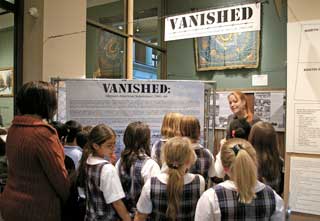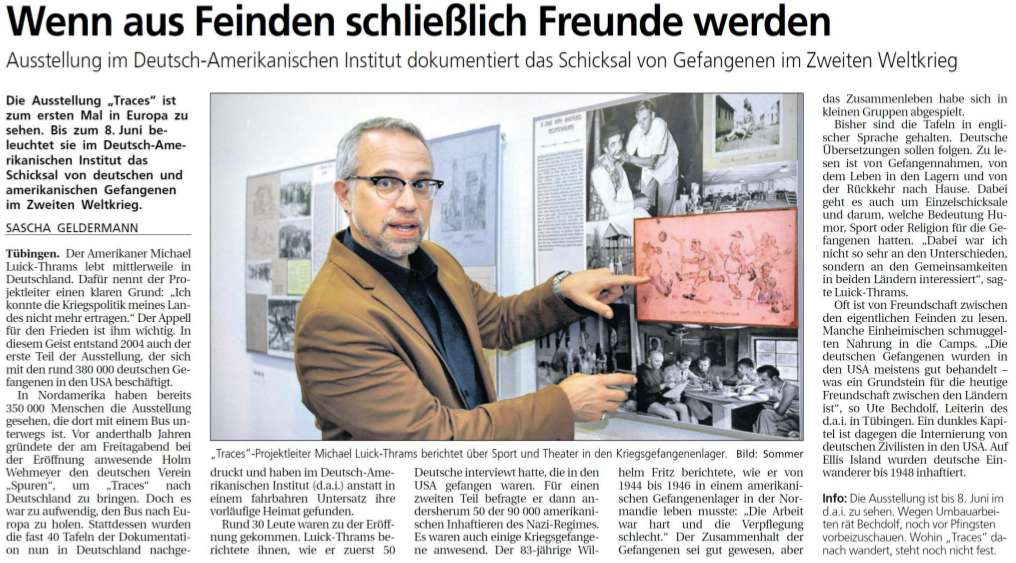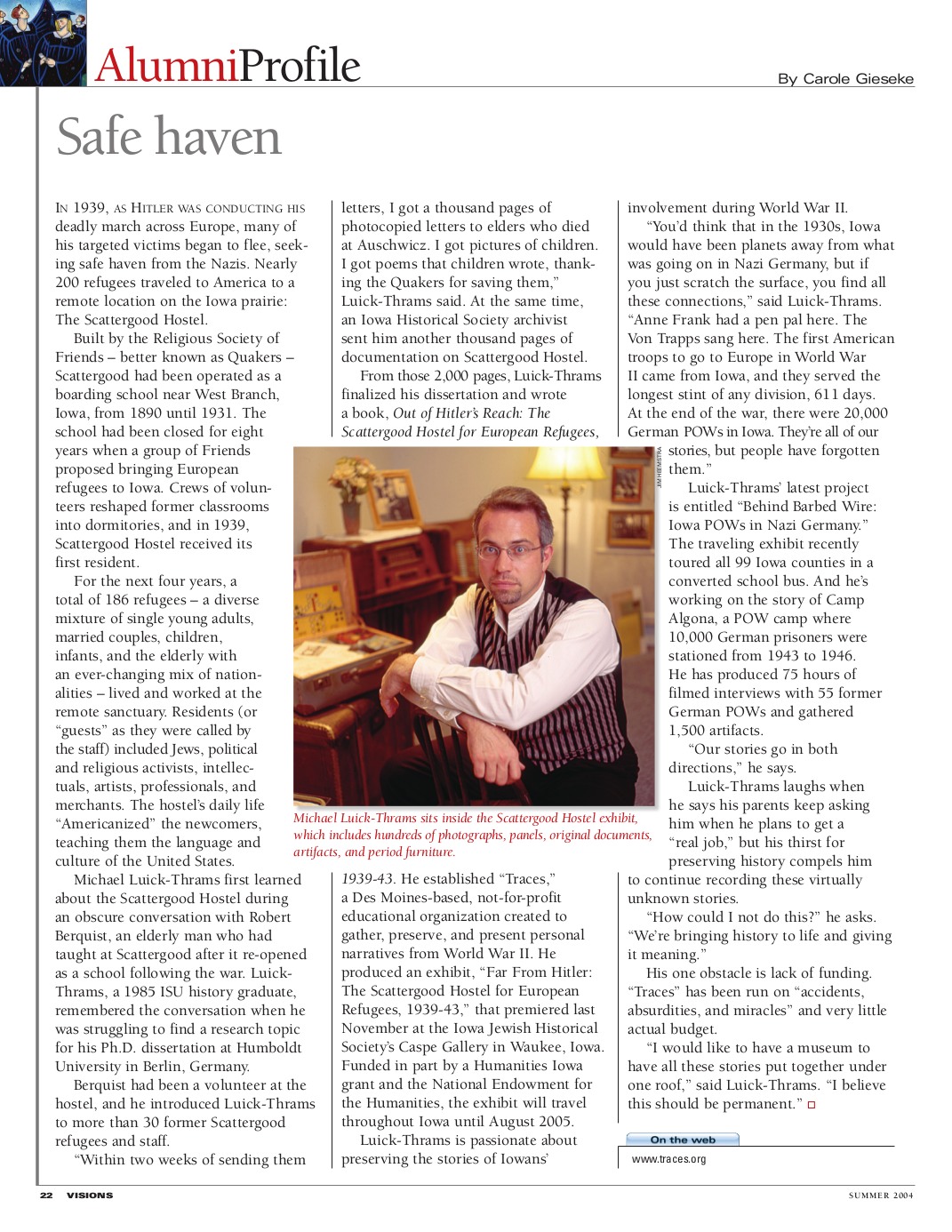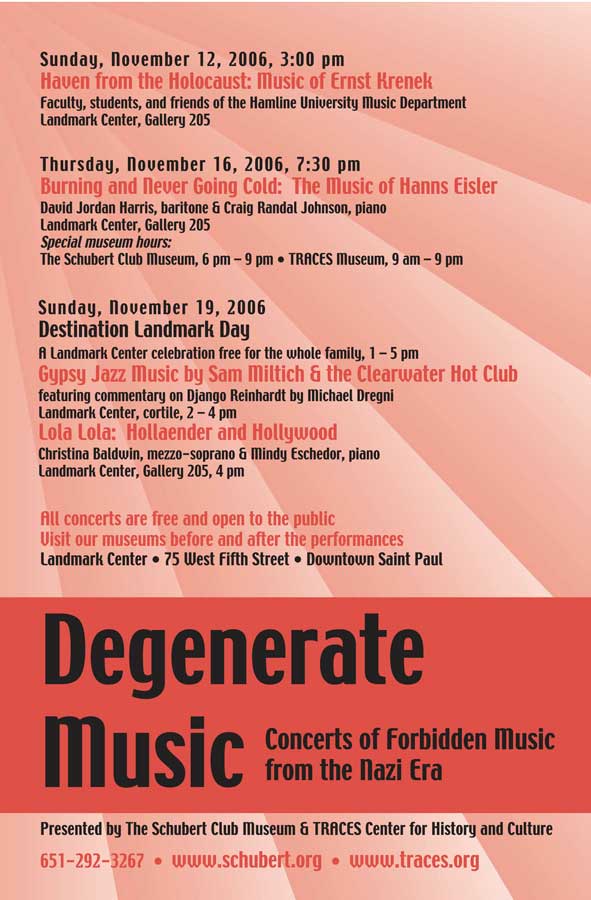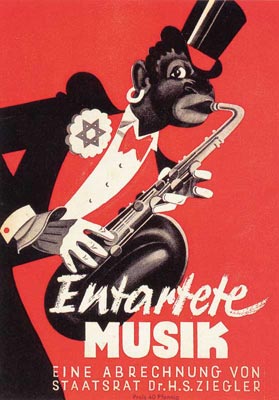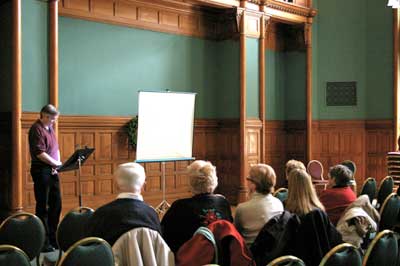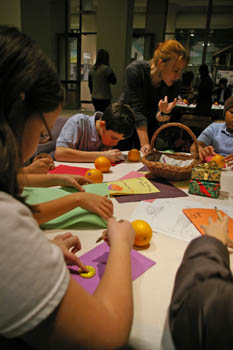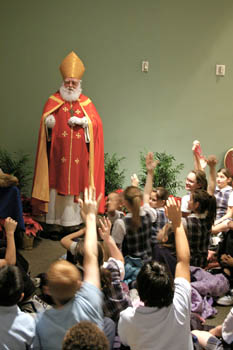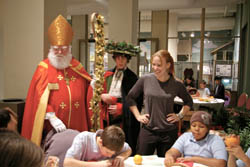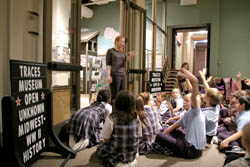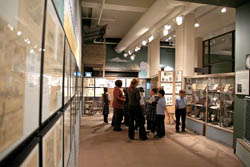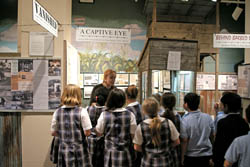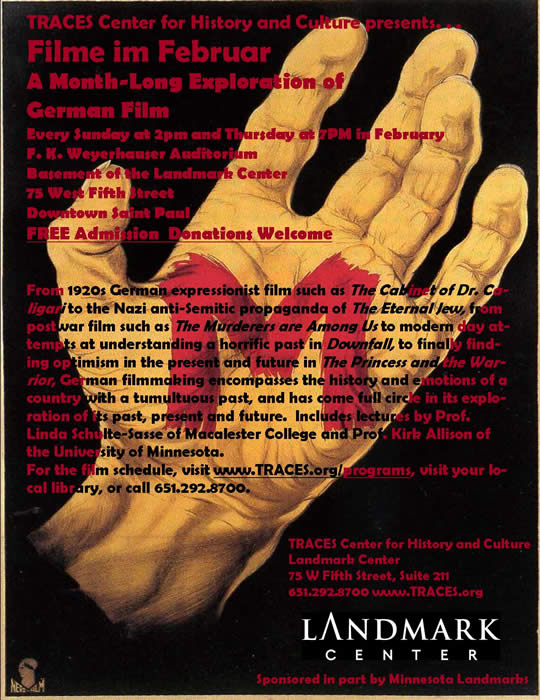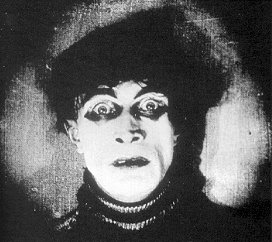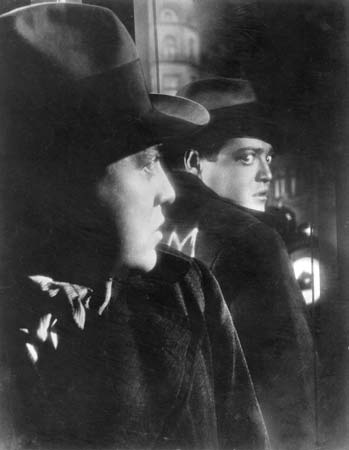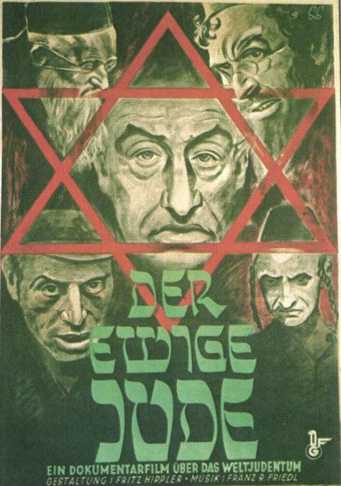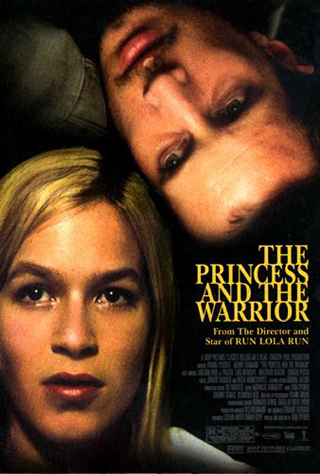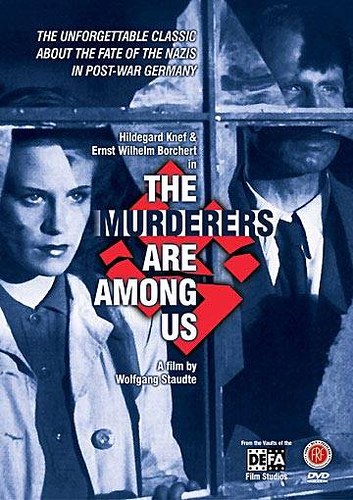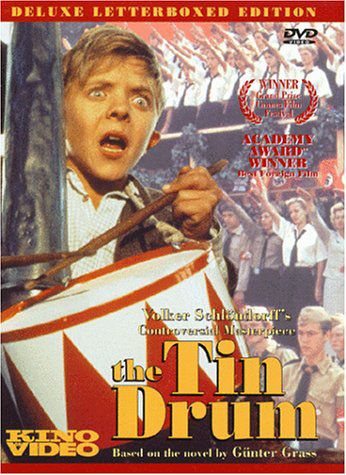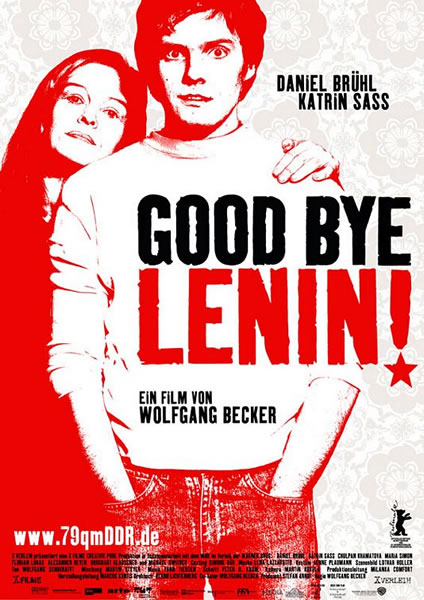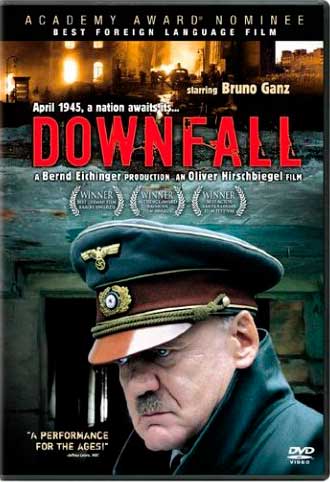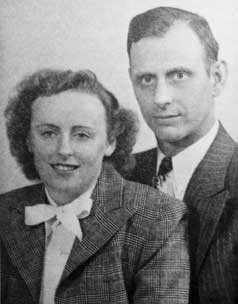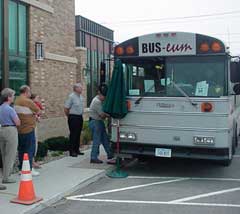
| |
Home |
Recent Programs | Recurring Programs | Past Program Highlights | Past Programs BUS-eum 1 tour spring 2008 | BUS-eum 2 tour spring 2008 | BUS-eum 3 tour fall 2008
|
||||||||||||||||||||||||||||||||||||||||||||||||||||||||||||||||||||||||||||
Past ProgramsStill the director of TRACES and now also the director of SPUREN, Michael Luick-Thrams continues to offer lectures about German POWs in the United States, US POWs in the Third Reich, German-American civilian internees in the US and related topics from the larger drama of the Second World War--as shown in the below article about the May-2012 opening of the multi-themed exhibit Other Losses at the Deutsch-Amerikanisches Institut/German-American Institute in Tübingen in Southwest Germany. The exhibit can be booked for showing in Germany or elsewhere in Europe by contacting TRACES volunteer Ceile Hartleib.
TRACES Board of Directors and volunteer staff will confirm up-coming programming over the next few months. Please see DE.TRACES.org to locate up-coming programs, especially those nearest you!
|
|||||||||||||||||||||||||||||||||||||||||||||||||||||||||||||||||||||||
THE HOLOCAUST AND THE HEARTLAND: The Long Reach of Persecution and Genocide, co-sponsored by the University of Minnesota Center for Holocaust and Genocide Studies; hosts, locations, times and dates negotiable course description | course readings with guiding questions | referrals from past participants
Past Program Highlights
6 December 2007 - 7:15PM Thursday at the Galleria, Landmark Center, Saint Paul Launch of Travelers Free First Thursday at TRACESChristmas historian James Neagbour presented a narrated Power-Point travelog Christmas in Nazi Germany in the Chief Justice Room 430, Landmark Center, with plans to present in 2008 Christmas on the Midwest Homefront.
“Filme im Februar / Films in February” German-Film Series
Weimar Republic Films At the beginning of the early 20th century, Germany had emerged as a leading center of the avant-garde and the birthplace of Expressionism in art and sculpture. These films reflect the creativity of the time.
Nazi Era Film After the freedom experienced under the Weimar Republic, the severe censorship and confined aesthetic of filmmaking under the Nazi regime was an extreme change. While exploring how the Nazis used non-propaganda films on the silver screen to serve their purposes, the question emerges: is art under censorship still valid?
Special Valentine’s Day Film
Post-War and Occupied-German Films In the period following the war, the German populace struggled to accept the atrocities they had participated in—directly or indirectly—under the Nazi regime. The following two films explore Germans’ search for some form of self-understanding during that tumultuous period of time.
Modern German Films From still coming to grips with their country’s history to moving ahead with new hope and creativity, these films show the range of modern German filmmaking.
6 March 2008 - 7PM Thursday in Courtroom 317, Landmark Center, Saint Paul Without Due Process: An Investigation of Unlawful InternmentTRACES sponsored two speakers: Teresa Nelson, Legal Counsel for the ACLU of Minnesota, who spoke about civil liberties violations involved with present-day detainment, while Michael Luick-Thrams, TRACES Executive Director, gave a historical overview of internment of German-American civilians during World War II. 3 April 2008 - noon Thursday in Chief Justice Room 430, Landmark Center, Saint Paul
Censorship: Then and Now
After noon showing a documentary film about attempts in Oklahoma City to remove from public access the German film The Tin Drum, TRACES staff led a discussion about this incident in specific, as well as censorship in general.
|
|||||||||||||||||||||||||||||||||||||||||||||||||||||||||||||||||||||||
Swords into Plowshares: German POWs in Minnesota, 1943-46Twin Cities author Dean Simmons presented the little-known WWII history story of German POWs imprisoned in the Upper Midwest during WWII. His book Swords into Plowshares focuses on the roughly 380,000 German soldiers who were POWs in the U.S., some 10,000 of whom spent time in camps across Iowa, Minnesota and the Dakotas. Simmons found that not only did the war take away countless Minnesota men, it also created an immense labor shortage - leading to state leaders requesting POWs to work the farms. Of great interest was not just that Minnesota used POWs for labor during the war, a fairly common practice then, but how well the prisoners were treated. Swords into Plowshares documents this thoroughly human story, the process by which captors and captives came to regard each other, in the words of one German POW, as "just people." Simmons also presented further material gathered after the publication of his book. TRACES unveiled it's exhibit Held in the Heartland, about German POWs in the Midwest. TRACES free monthly programming was made possible by a grant from Travelers. |
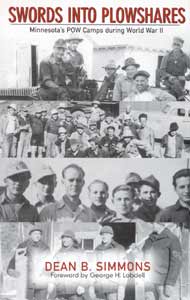 |
2 October 2008 - noon Thursday in 2nd floor Galleria, Landmark Center, Saint Paul
"You Have Been Kind Enough to Assist Me":
|
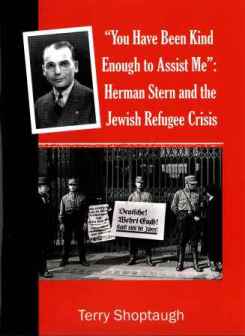 |
6 November 2008 - noon-1PM Thursday at the Galleria, Landmark Center, Saint Paul
Past as Prolog: Learning from Shared Legacies
TRACES Executive Director Michael Luick-Thrams gave a guided tour of the museum, followed by commentary on how the overall TRACES project has used historical contexts to shed light on contemporary issues of war and peace.
7 November 2008 - 10am-5PM Thursday at Highland Park Branch Library, 1974 Ford Prkwy, St. Paul Behind Barbed Wire: Midwest POWs in Nazi GermanyUntil the Battle of the Bulge in December 1944, the most U.S. POWs in Nazi hands came, per capita, from the Midwest.Visitors learned about this legacy through didactic panels, ten display cases with actual artifacts, three films and Director Michael Luick-Thrams as docent. |
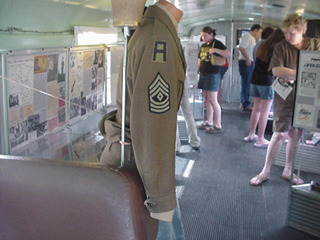 |
|---|
19 November 2008 - 12-1:15PM Wednesday at the Bishop Henry Whipple Building, Fort Snelling, Saint Paul/MN
Midwest POWs in Germany/German POWs in the Midwest in WWII
As part of the Federal Executive Board of the Twin Cities EEO Diversity Day TRACES Executive Director Michael Luick-Thrams will narrate two Power Point presentations about POWs in Germany and the Midwest during WWII, with emphasis on how the treatment they received affected post-war relations as well as the men's own lives.
1:30-2:45PM Wednesday at the Bishop Henry Whipple Building, Fort Snelling, Saint Paul
7 December 2008 - 1-3pm Sunday at the Community Center, Crystal City/TX and 4-6pm at the Public Library, Uvalde/TX
Psychological/Social Effects of U.S. WWII Internment of German-American Civilians
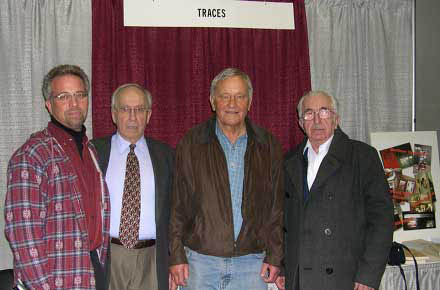 |
Former internee Eberhard Fuhr spoke about having been interned in Camp Crystal City, and at Ellis Island after being almost deported to wartime Germany, with his immigrant parents and American-born brothers. Michael Luick-Thrams first narrated a Power Point presentation about German-American civilian internees in U.S. Government camps during WWII, with emphasis on how their experiences affected their post-war lives.
Michael Luick-Thrams' video presentation interview with former internee Art Jacobs Germans Interned in Texas during WWII -Texas Public Radio News 1945 U.S. Gov't film of Camp Crystal City/TX | la película en espanol English/Spanish Transcript of NBC Dateline about WWII-Era Civilian Internment |
Michael Luick-Thrams (left), with former internees Eberhard Fuhr (Chicago), Carlo Krause and Guenther Greis (both of Wisconsin); the latter two generously helped underwrite the costs of showing VANISHED in Texas, as did Humanities Texas. |
15 July 2009 - 1:30-2:30pm Wednesday at the Wabasha Street Caves, Saint Paul; Susanne Deitermann at Susanne@learnersedgeinc.comlearnersedgeinc.com or 877.394.4930 and www.learnersedgeinc.com description organized this event.
Beyond Chalk and Talk: Bringing Narrative History to Life In and Outside the Classroom!
History isn't boring, but history classes too often are! This course explored how to excite young and older learners alike, using "traces" of narratives left behind by history: letters, diaries, poetry or prose, articles, as well as photos, drawings, paintings or other artwork. In this instance, we used Midwest/WWII history as a case study, but creative teachers could apply the proven techniques behind effectively conveying these popular stories to wide audiences. The course utilized actual first-person documents in our work and activities.
19 October 2009 - 10:30-noon Monday at Iowa’s Mosaic Diversity Conference in the Scheman Center, Iowa State University, Ames
Schindler's List on the Prairie: Iowa's Scattergood Hostel for European Refugees, 1939-43
During some of the darkest days of the Nazis' reign of terror, 186 people found a safe haven on the Iowa prairie, at what had been a Quaker boarding school. There, individuals who likely would have perished at the hands of institutionalized hatred found compassionate help in rebuilding their lives. Supported by Iowa Quaker farmers and their allies, and staffed mostly by college-age volunteers, the hostel provided a rare, hands-on example of how the actions of "ordinary" people can change the lives of others, and shift the world on its axis.
29 March-19 April 2010 - various times & locations, Twin Cities/Saint Cloud Metro Areas & Central Minnesota War and the North Star:
|
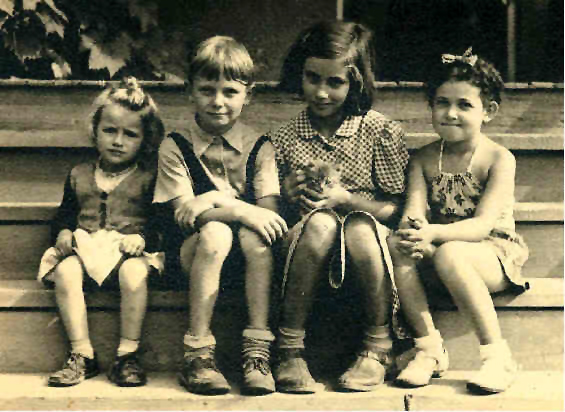 Edith Lichtenstein (holding kitten) sits with her brother Louis and two other child refugees at Scattergood Hostel, circa 1942. |
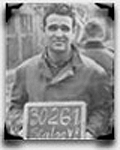 |
25 April - 5 May 2010 - various times & locations in 18 communities across North Dakota War Comes to the Peace Garden: Two-Week WWII History Exhibit and Programs follow Day-Long Launch Event at State Capitol Grounds in Bismarck |
|
13-15 October 2010 - at various times and dates at Coe College, Cedar Rapids/Iowa
A 20th Century Journey: The Influence of William L. ShirerSymposium on World Politics, Journalists and Their Impact on Society |
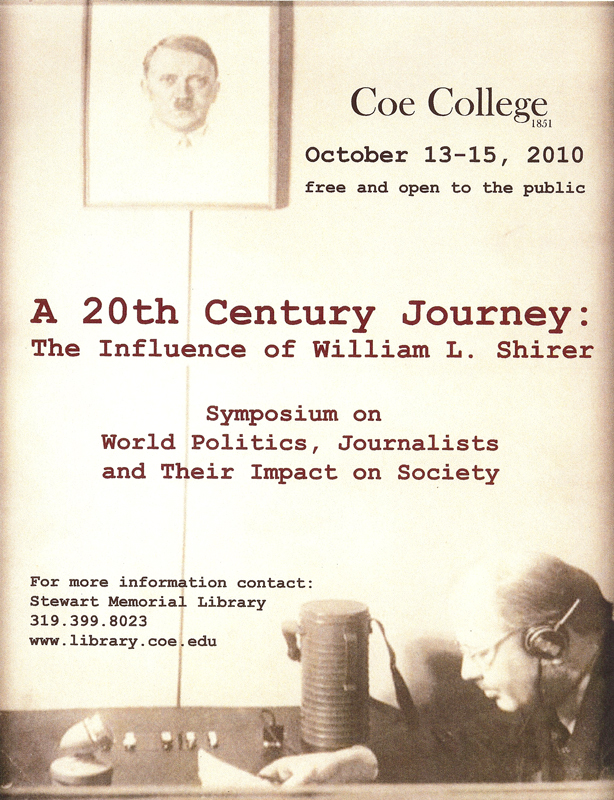 |
Program Cover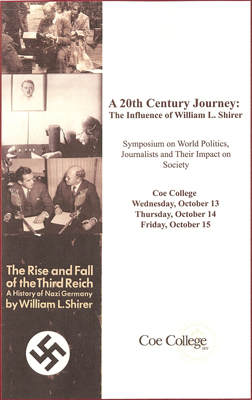 |
22 January 2011 - Saturday at Adath Jeshurun Synagogue, 10500 Hillside Lane West, Minnetonka/MN 55305; Nina Samuels at ninas@adath.net or 952.215.3904 organized this event.
Outside the Camps: The Untold History of Jews in the Midwest in WWII
European and U.S. Jewish history involves more than just the Hitler/Holocaust duality often presented as "The Complete History" of a diverse people during a specific time. TRACES staff member Irving Kellman offered a survey of Midwest-related Jewish history during the years dominated but not defined solely by Nazism. Among other topics, he spoke about Midwest efforts to save Jewish and other refugees from Nazi-occupied Europe, the internment of Jewish-refugee and other German-American civilians, the fate of Jewish Midwest POWs in the Third Reich, the work of Jewish translators at camps for German POWs in the Midwest--and other unknown sub-chapters of the larger WWII drama.
11 February 2011 - 10.45-11.30am and 1.30-2.45pm Friday at the Academy for Sciences & Agriculture, 100 Vadnais Boulevard, Vadnais Heights/MN 55127; Paul Peterson at ppeterson@agacademy.com or 651.259.4971 organized this event.
More than Corn: A Survey of the Rural Midwest's Experiences of WWII
The rural Midwest's WWII history involved more than just sending the region's men off to fight Nazi and Japanese tyranny. TRACES Executive Director Michael Luick-Thrams offered a survey of Midwest-related European WWII-era history during the years dominated by Hitler and his followers, as documented by "witnesses" journals, letters, artwork, photos and other first-person accounts. Among other topics, he spoke about Midwest Quaker farmers' efforts to save Jewish and other refugees from Nazi-occupied Europe, the internment of German-American civilians in camps in the Midwest, the fate of Midwest POWs from rural communities in the Third Reich, camps for German POWs across the rural Midwest--and other, mostly unknown sub-chapters of the larger WWII drama.
17-18 May 2011 - At various times, Tuesday and Wednesday at the Carver County Public Library system; Heidi Hoks at hhoks@co.carver.mn.us or 952.856.4503 organized this event.
Tuesday, May 17th Wednesday, May 18th
10am - 1pm Norwood Young America Library 10 am - 1pm Waconia Library
1:30 - 4:30pm Chaska Library 2 - 5pm Watertown Library
5 - 8pm Chanhassen Library
Behind Barbed Wire: Midwest POWs in Nazi Germany, 1943-45
Until the Battle of the Bulge in December 1944, the most U.S. POWs in Nazi hands came, per capita, from the Midwest.Visitors from the southwest Metro Twin Cities area and beyond learned about this legacy through didactic panels, ten display cases with actual artifacts, three films and Director Michael Luick-Thrams as docent.
|
4 May 2012 - As of 7PM Thursday at the Deutsch-Amerikanisches Institut Tübingen/German-American Institute Tübingen; Karlstrasse 3, 72072 Tübingen/Germany; contact Ute Bechdolf at mail@dai-tuebingen.de or per telephone 0049(0)7071.795 26-0 or fax 795 26-26
The lecture complemented the opening of Other Losses, set to show May and June in Tübingen. See the related article near the top of this page for an in-depth description of the exhibit. |

|
26 May - 10 June 2012 - As of 10AM Saturday, 26 May, through Sunday noon, 10 June, at various locations in Southern Germany
Swabian English Camp
The TRACES Board of Directors supported a blending of past Midwest-German history projects and Executive Director Michael Luick-Thrams' temporary teaching engagement in Southern Germany in the form of a "Swabian English Camp" where two young American Quakers and a Waldorf co-ed from Arizona came to Remstal for two weeks, hosted by families from the local Waldorf school. Luick-Thrams organized both social and instructional sessions where the Americans and their young-German counterparts learned a great deal--about each other, as well as each others' native cultures, history, politics, economics, etc.
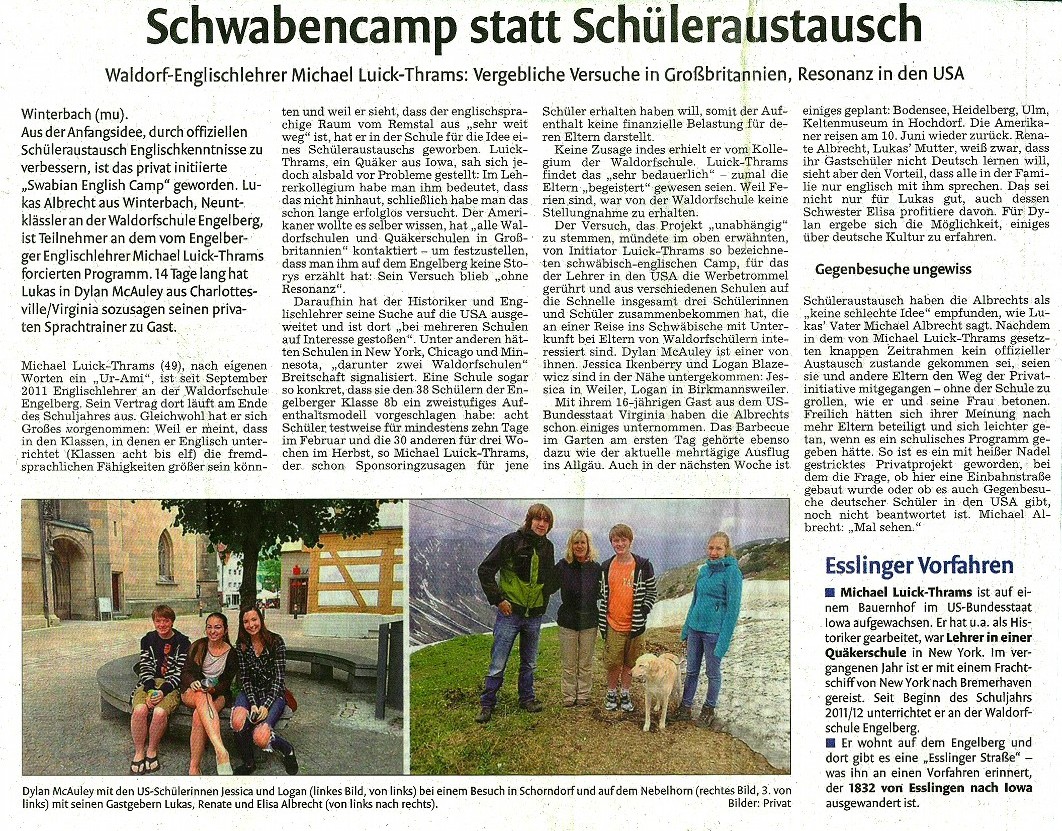
Schorndorfer Nachrichten, 2 June 2012

|
20 June 2012 - As of 9:30AM Wednesday at Humboldtschule; Jacobistraße 37, 61348 Bad Homburg/Germany; contact Anke Haueisen at Anke@Haueisen.net or per telephone 0049(0)177.596 2375 or (0)69.94412284
Michael Luick-Thrams shared with Frau Haueisen's upper-school pupils stories interweaving contemporary Germany, Greater Frankfurt (which includes Bad Homburg) and the wartime stories TRACES tells. He also extracted lessons from the overall history reviewed that morning for the young-adult Germans in his lively audience to reflect and comment upon, then subsequently use. |
23 November 2012 - At 6PM Friday, as guest facilitator of the Quäker in Hessen Gruppe Frankfurt; Leerbachstraße 62, Frankfurt/Germany; contact Eugenie Bosch at mail@eugeniebosch.de or Lydia Stephan per telephone 0049(0)69.724559
Tapping impulses and ideas gathered during ten years of leading TRACES and then the Burr Oak Center, Michael Luick-Thrams shared these perspectives and proposals in the form of an evening discussion group built around the theme 10 x +/Solutions: Integrating Problems and Potential into a Self Rescue for Our Species and Planet.
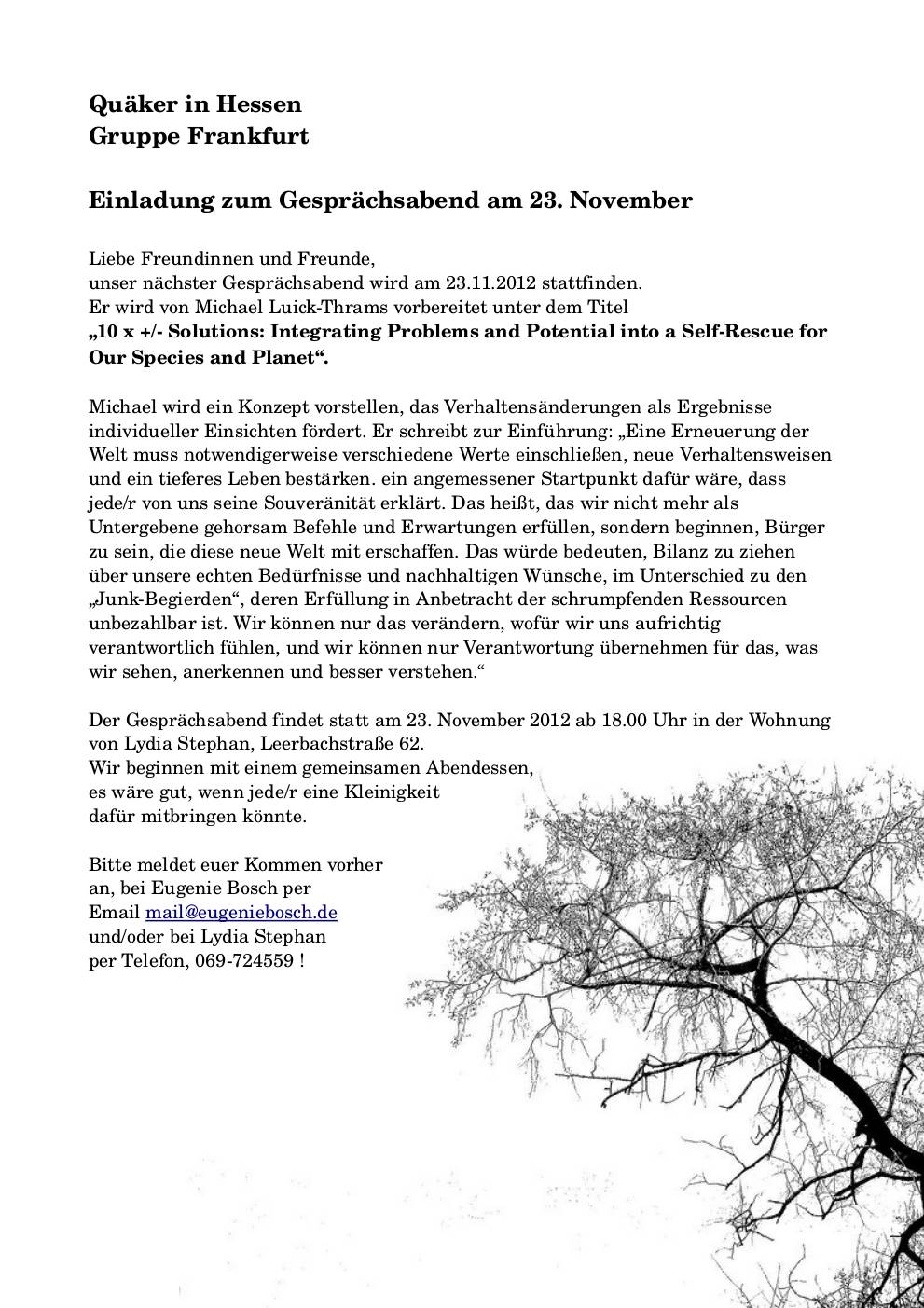
|
25 January 2013 - At 7PM Friday, a staged reading of Scott Dixon's new play Enemy Alien, followed by a feedback session, at the Commonweal Theatre, 208 Parkway Ave. N., Lanesboro/MN 55949; admission free but reservations recommended at 800.657.7025.
Adapted from a 16 January 2013 posting by Tom Weber at http://www.postbulletin.com New WWII play gets reading at CommonwealLANESBORO — A new play being developed by Lanesboro actor/writer Scott Dixon will be presented in a staged reading January 25th at the Commonweal Theatre. Dixon's play, Enemy Alien, is about two German-American brothers held in an internment camp in North Dakota during World War II. The story formed in Dixon's imagination after he saw an exhibit at the TRACES Center for History and Culture in St. Paul about the internment of Germans and German-Americans during the war. "I was really intrigued by this lost chapter of history," Dixon said. "It fired my imagination, thinking 'What would I do in that situation?' " Dixon is a member of the resident company at the Commonweal, where he has staged an original play, A Midnight Dreary, about the life of Edgar Allan Poe. He has also published a book of short stories. In Enemy Alien, the two brothers take opposite approaches to their internment. One decides to prove he's a patriotic American, while the other begins to think and behave like an enemy alien. Several thousand German-Americans were moved to internment camps during the war. Most of those camps were in the Midwest. Dixon said "It's a part of our local history." While developing the plot, Dixon opted early on to write a play rather a prose story or a book. "For me, the drama of the story grabbed me in such a way that it hit my imagination as a play," he explained. "I thought of it as an intimate story, a personal human story at the center of it and, to me, that spoke of a theatrical process." For the staged reading, actors will read from the script. It will be followed by a talk-back session. "That audience feedback is going to tell me a lot about what I want to do with this script," Dixon said. "The audience is really a valuable part of the creative process." |
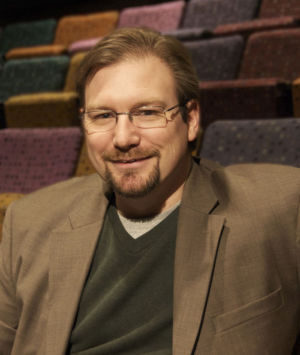
Scott Dixon |
2007 | 2006 | 2005 | 2004 | 2003 | 2002 | 2001 | 2000-2001 | Home | |
||||||||
|---|---|---|---|---|---|---|---|---|
